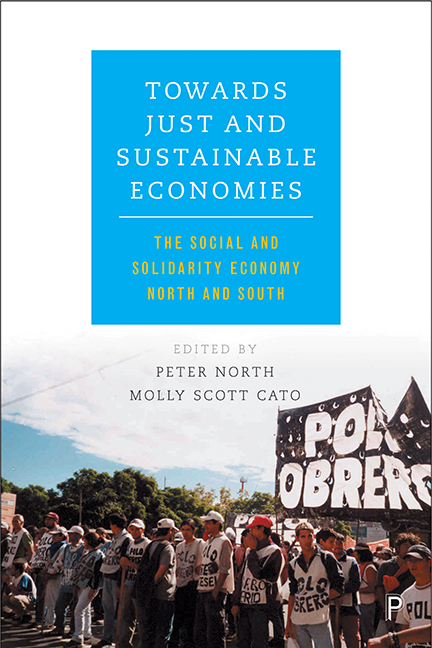Book contents
- Frontmatter
- Dedication
- Contents
- List of figures and tables
- Notes on contributors
- Acknowledgements
- One Introduction: new economies North and South – sharing the transition to a just and sustainable future
- Part I Theoretical perspectives on the social and solidarity economy
- Part II The social and solidarity economy as a site of social innovation
- Part III The social and solidarity economy and the state
- Part IV Policy translation between North and South
- Index
Eleven - Solidarity economy dialogue in Latin America: transferring Argentine experiences of social currencies to Brazil
Published online by Cambridge University Press: 05 April 2022
- Frontmatter
- Dedication
- Contents
- List of figures and tables
- Notes on contributors
- Acknowledgements
- One Introduction: new economies North and South – sharing the transition to a just and sustainable future
- Part I Theoretical perspectives on the social and solidarity economy
- Part II The social and solidarity economy as a site of social innovation
- Part III The social and solidarity economy and the state
- Part IV Policy translation between North and South
- Index
Summary
The solidarity economy
The solidarity economy (SE) is a mode of production originally conceived in Europe by workers as a defensive reaction against their proletarianisation by the first Industrial Revolution during the 19th century. Before they were forced to become wage labourers in the newly invented factories, these workers had been autonomous artisans, who used to sell their products directly to consumers or to merchants in the then widespread ‘putting out’ system. As wage workers they had to submit themselves to the orders of the employers, working very long hours to get a meagre wage (Singer 1975; 1977; 1980a). Poverty and insecurity became their lot: the business cycle periodically made many of them unemployed, and each advance of technical progress made the skills of many of them obsolete, turning them again into unskilled labourers and exposing them to the fate of long-term unemployment. In the defence of their status as autonomous producers, labourers unable to individually withstand the mortal competition of industrial capitalism invented the labour cooperative, which is the cornerstone of what is known now as social economy in Europe and elsewhere. Over a century later, this new mode of production evolved into very different forms and is currently most often referred to as social and solidarity economy (SSE) in intercontinental dialogues.
In our view, the historical origin of the SSE explains its main characteristics: the social and solidarity enterprise is the joint property of all persons who work in it. The cooperative was invented to escape oppression by capital, so equality is one of the main values of the SSE. The social capital of the cooperative is equally shared by all workers, who become members or associates of their enterprise. Each member has an equal share of the capital of the cooperative. From this fact derives equal rights of each of them to take part in decision making in their enterprise. Decisions are taken mostly in assemblies, in which all members take part with equal rights: one vote for each person (Singer, 1980b; 1983; 1987).
Cooperatives are designed to be democratic and egalitarian organisations and in order to remain so they should not have employees. Their principle is necessarily that anyone who is a member must work in the cooperative, and anyone who works in it must be a member.
- Type
- Chapter
- Information
- Towards Just and Sustainable EconomiesThe Social and Solidarity Economy North and South, pp. 195 - 212Publisher: Bristol University PressPrint publication year: 2017



